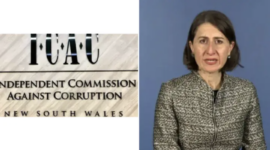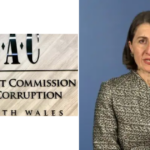Gladys Berejiklian ‘Engaged in Serious Corrupt Conduct’, But Won’t Be Criminally Prosecuted

The New South Wales Independent Commission Against Corruption (ICAC) has handed down damning findings against former Premier Gladys Berejiklian, and her secret lover Daryl Maguire, yet it will not be recommending that the Office of the Director of Public Prosecutions consider bringing criminal charges against the former premier.
ICAC’s long awaited final report was so sought after when it was published online this week, that the state corruption watchdog’s website crashed.
Resigned after being notified of investigation
Ms Berejiklian resigned from Parliament in September 2021, announcing she was under investigation by ICAC after it had been revealed earlier in the hearings for Operation Keppell, that she had engaged in a ‘secret relationship’ with disgraced Wagga Wagga MP Daryl Maguire while she was the state’s premier.
And now, the recently released report has been sure not to mince words.
ICAC’s findings
ICAC has found that both Ms Berejiklian and Daryl Maguire “engaged in serious corrupt conduct”.
In respect of the former premier, the watchdog found that she breached the public’s trust with regard to approving multi-million dollar grants for the Australian Clay Target Association ($5.5 million) and the Riverina Conservatorium of Music in Wagga Wagga ($10 million, more was allocated, but never spent).
Specifically, the former premier had failed to declare the ‘secret relationship’ she was having with Mr Maguire, which amounted to a conflict of interest between her personal life and her public duties.
One of the pair’s conversations went as follows:
Ms Berejiklian: ‘I just need to go and chill because you have stressed me out’.
Mr Maguire: ‘I’ll go and chill as long as you throw money at Wagga’.
Ms Berejiklian: ‘I will throw money at Wagga, don’t you worry about that’.
Senior bureaucrats testified there was ‘scant evidence’ to justify the funding, describing it as ‘unusual an unwarranted’.
Further, ICAC determined that Ms Berejiklian acted corruptly by not disclosing any suspicions she may have had of Mr Maguire’s corrupt conduct.
In that regard, one of their conversations involved Mr Maguire telling the former premier about a corrupt deal, and the latter suggesting she did not want to hear about it:
Mr Maguire: ‘William tells me we’ve done our deal so hopefully that’s about half of all that gone now’.
Ms Berejiklian: ‘I don’t need to know about that’.
After combing through a voluminous quantity of texts and emails, and hours of recorded phone conversations as well as witness testimony provided during hearings, ICAC determined Berejiklian engaged in “serious corrupt conduct” by failing to notify ICAC that Daryl Maguire had “engaged in activities which concerned, or might have concerned, corrupt conduct”.
ICAC’s report noted that Ms Berejiklian must have known that she was not entitled to refuse to exercise her official functions for her own private benefit, or for the benefit of Mr Maguire.
“To conceal conduct she suspected concerned, or might have concerned, corrupt conduct on the part of Mr Maguire, another member of Parliament, both to protect herself and him from the Commission exercising its investigative powers was grave misconduct. It undermined the high standards of probity that are sought to be achieved by the ministerial code which, as premier, Ms Berejiklian substantially administered.”
The Commission concluded:
“For the premier of the state to act dishonestly and improperly for their private benefit is egregious.’
No charges will be laid against Ms Berejiklian
Despite the seriousness of ICAC’s findings, the Commission determined it would not be referring the matter to the DPP for the consideration of criminal charges:
“The Commission is of the view that Ms Berejiklian’s conduct, while it constitutes or involves a substantial breach of the ministerial code, it is not so serious that it could be demonstrated to merit criminal punishment”, the report reads.
To put this in context, ICAC’s findings were not made on the criminal standard, but rather “on the balance of probabilities”, which is the standard for determining civil matters.
In its report, ICAC describes the criminal standard as a “very high bar” to be met when it comes to the relevant offence of “misconduct in public office”; which is the offence for which a number New South Wales politicians such as Eddie O’Beid and Ian MacDonald have been successfully prosecuted in the past.
It also notes that, given Ms Berejiklian gave her evidence to the ICAC investigation under objection (on other words, she was compelled to testify under ICAC’s coercive powers), it would not be admissible against her in any criminal proceedings.
Ultimately, the ICAC report conceded that there are a number of obstacles to prosecutions which are “so formidable as to make it reasonably clear that any advice from the Director of Public Prosecutions (DPP) with respect to the matter would be to the effect that no prosecution may be commenced”.
However, many see this as not good enough, and that such a matter of public interest should be referred to the DPP and that the prosecutorial body should, in turn, leave the matter to be decided by a court of law.
Teflon Gladys
This is not the first time a finding of misconduct has been made against Ms Berejiklian.
In 2021, an investigation by the State Archives and Records Authority (the ‘SARA’) found that the New South Wales Premier’s office broke the law when they shredded documents relating to $252 million in grants, however SARA never pursued the possibility of legal accountability – leading some to label the former premier ‘Teflon Gladys‘ for her ability to avoid accountability.
It’s disappointing, some may even consider it unjust. However, we have to be satisfied with the fact that Ms Berejiklian’s conduct has been recorded for the history books. Whatever her legacy may have been, it is now marred by these findings.
On a positive note, her actions may in fact be a much needed catalyst for changing the system so that those in positions of political power are made much more accountable for spending taxpayer dollars, at least.
To that end, ICAC has made 18 recommendations for NSW parliament to consider adopting which will address gaps in codes of conduct that govern the conduct of MPs, improving their training and that of their staff, and improving the integrity of grant schemes.
The recommendations aim to address “systemic weaknesses” found during ICAC’s investigation, and to “reinforce NSW parliament’s ethical culture”.
ICAC also intends to launch an education campaign on the importance of reporting suspected corrupt conduct, which is all very well in theory, but as has been said many times before, until there are better protections in place for whistleblowers, it’s not guaranteed they will come forward and report misconduct.
Daryl Maguire could face charges
With respect to Daryl Maguire, ICAC has recommended that the DPP consider evidence in relation to charging Daryl Magure. ICAC found that he improperly used his office as an MP to benefit G8wayInternational Pty Ltd, a company of which he was in substance a director, and whose profits he had an arrangement to share with others.
ICAC also determined that Maguire was found to have misused his role as an MP to advance his own financial interests in connection with an immigration scheme that he promoted to his constituents and others connected with his electoral district.
The DPP will determine whether to take the matter further.
What is corrupt conduct in New South Wales?
Under section 8 of the Independent Commission Against Corruption Act 1988, the definition of corrupt conduct is set out as follows:
(1) Corrupt conduct is—
(a) any conduct of any person (whether or not a public official) that adversely affects, or that could adversely affect, either directly or indirectly, the honest or impartial exercise of official functions by any public official, any group or body of public officials or any public authority, or
(b) any conduct of a public official that constitutes or involves the dishonest or partial exercise of any of his or her official functions, or
(c) any conduct of a public official or former public official that constitutes or involves a breach of public trust, or
(d) any conduct of a public official or former public official that involves the misuse of information or material that he or she has acquired in the course of his or her official functions, whether or not for his or her benefit or for the benefit of any other person.
(2) Corrupt conduct is also any conduct of any person (whether or not a public official) that adversely affects, or that could adversely affect, either directly or indirectly, the exercise of official functions by any public official, any group or body of public officials or any public authority and which could involve any of the following matters—
(a) official misconduct (including breach of trust, fraud in office, nonfeasance, misfeasance, malfeasance, oppression, extortion or imposition),
(b) bribery,
(c) blackmail,
(d) obtaining or offering secret commissions,
(e) fraud,
(f) theft,
(g) perverting the course of justice,
(h) embezzlement,
(i) election bribery,
(j) election funding offences,
(k) election fraud,
(l) treating,
(m) tax evasion,
(n) revenue evasion,
(o) currency violations,
(p) illegal drug dealings,
(q) illegal gambling,
(r) obtaining financial benefit by vice engaged in by others,
(s) bankruptcy and company violations,
(t) harbouring criminals,
(u) forgery,
(v) treason or other offences against the Sovereign,
(w) homicide or violence,
(x) matters of the same or a similar nature to any listed above,
(y) any conspiracy or attempt in relation to any of the above.
(2A) Corrupt conduct is also any conduct of any person (whether or not a public official) that impairs, or that could impair, public confidence in public administration and which could involve any of the following matters—
(a) collusive tendering,
(b) fraud in relation to applications for licences, permits or other authorities under legislation designed to protect health and safety or the environment or designed to facilitate the management and commercial exploitation of resources,
(c) dishonestly obtaining or assisting in obtaining, or dishonestly benefiting from, the payment or application of public funds for private advantage or the disposition of public assets for private advantage,
(d) defrauding the public revenue,
(e) fraudulently obtaining or retaining employment or appointment as a public official.
(3) Conduct may amount to corrupt conduct under subsection (1), (2) or (2A) even though it occurred before the commencement of that subsection, and it does not matter that some or all of the effects or other ingredients necessary to establish such corrupt conduct occurred before that commencement and that any person or persons involved are no longer public officials.
(4) Conduct committed by or in relation to a person who was not or is not a public official may amount to corrupt conduct under this section with respect to the exercise of his or her official functions after becoming a public official. This subsection extends to a person seeking to become a public official even if the person fails to become a public official.
(5) Conduct may amount to corrupt conduct under this section even though it occurred outside the State or outside Australia, and matters listed in subsection (2) or (2A) refer to—
(a) matters arising in the State or matters arising under the law of the State, or
(b) matters arising outside the State or outside Australia or matters arising under the law of the Commonwealth or under any other law.
(6) The specific mention of a kind of conduct in a provision of this section shall not be regarded as limiting or expanding the scope of any other provision of this section.
It must also involve one of the following things: a criminal offence; a disciplinary offence; reasonable grounds for terminating the services of a public official; or a substantial breach of the code of conduct that applies to ministers or MPs.
Receive all of our articles weekly
Related Articles
RELATED LEGISLATION
- Section 7 Independent Commission Against Corruption Act 1988 | Corrupt Conduct
- Section 9 Independent Commission Against Corruption Act 1988 | Limitation on Nature of Corrupt Conduct
- Section 10 Independent Commission Against Corruption Act 1988 | Complaints About Possible Corrupt Conduct
- Section 11 Independent Commission Against Corruption Act 1988 | Duty to Notify Commission of Possible Corrupt Conduct







